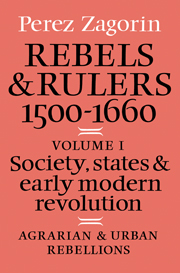Summary
If of the making of books on revolution there appears to be no end, this is because the subject of revolution continues to possess a compelling significance for contemporary historiography and other disciplines.
The present book is the product of a combined interest in the general and historical problem of revolution and in the society and civilization of early modern Europe. It has grown naturally out of my previous work devoted principally to the history of early modern England and to the English revolution of 1640–60. Its purpose is twofold: first, to add to the comprehension of revolution by means of a comparative treatment of the revolutions of the sixteenth and earlier seventeenth centuries in their appropriate context; second, to throw further light on the society that produced these revolutions and thus determined their character and limits.
In pursuing these ends, I have also sought to aid understanding by pointing out some of the misconceptions frequently found in discussions of revolution. A part of the reason for these misconceptions is explained in the first chapter. That one of their main sources is Marxism, however, has made it necessary for me to criticize in various places both the Marxist theory and Marxist interpreters of revolution. In my judgment, everything valuable and true in the thought of Marx himself has by now been fully assimilated into history and the other social sciences as their common property and resource. What still survives as “Marxism,” therefore, is in the East a petrified philosophy maintained as official dogma by authoritarian regimes and in the West an intellectual pastime for professors and commentators ranged into rival doctrinal schools.
- Type
- Chapter
- Information
- Rebels and Rulers, 1500–1600Society, States, and Early Modern Revolution, pp. vii - viiiPublisher: Cambridge University PressPrint publication year: 1982

